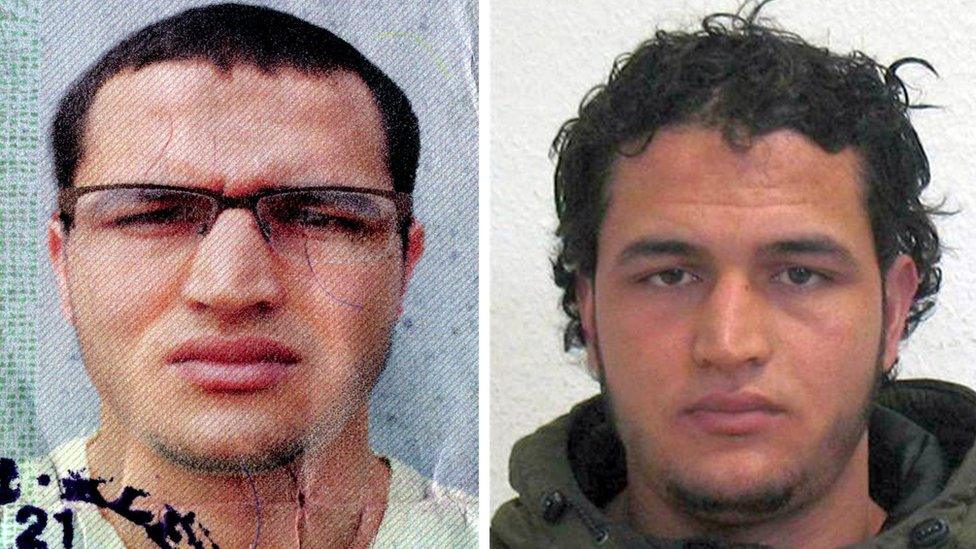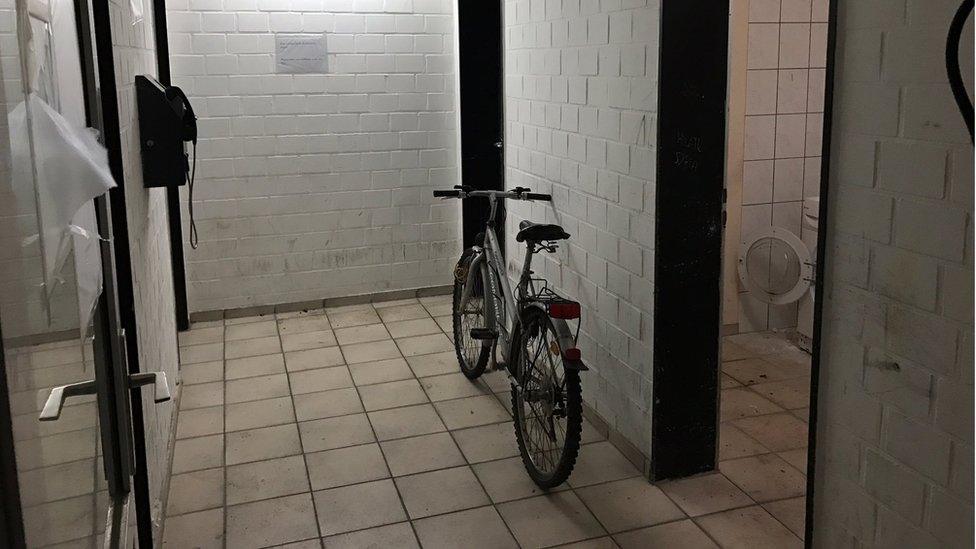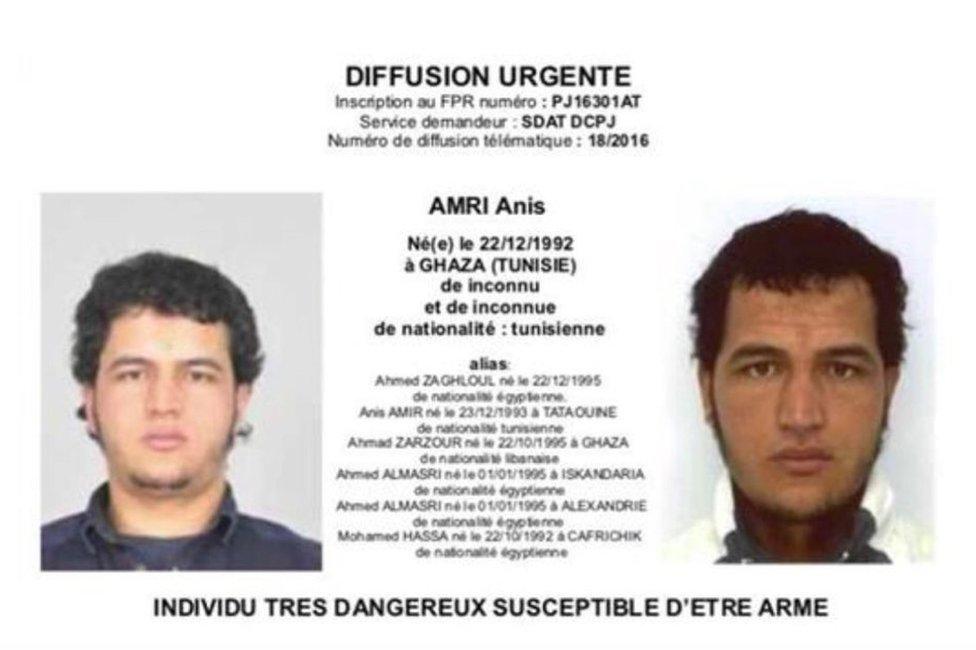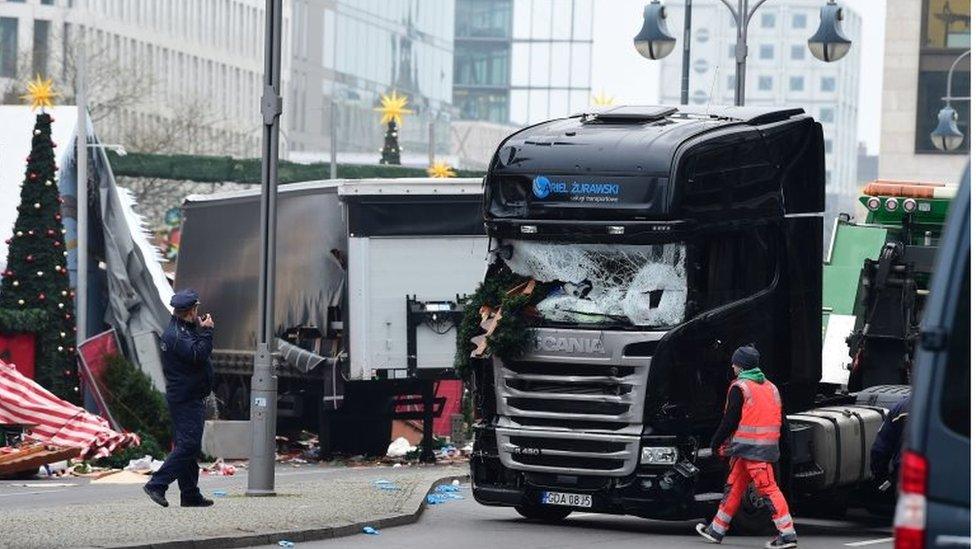Berlin attack: Tunisian fugitive 'had been under surveillance'
- Published

German federal police have released images of Anis Amri
A Europe-wide manhunt is under way for the Tunisian man wanted for the lorry attack on a Christmas market in Berlin in which 12 people were killed.
Anis Amri, 24, had been monitored earlier this year on suspicion of planning a robbery in order to pay for guns but surveillance was lifted for lack of evidence.
Before entering Germany, he had served four years for arson in Italy.
Monday evening's attack also left 49 people injured.
A European arrest warrant was issued after Amri's residence permit was found in the cab of the lorry that left a trail of carnage at the market near west Berlin's most famous shopping street, the Kurfuerstendamm.
The German authorities warn he could be armed and dangerous and are offering a reward of up to €100,000 (£84,000; $104,000) for information leading to his arrest.
It is thought Amri may have been injured in a struggle with the Polish driver of the lorry, found murdered in the cab.
On Thursday morning there were reports, external of police raids in the western city of Dortmund. Two apartments were searched and four people arrested, local media reported.
Amri was reported by the Ruhrnachrichten, external news website to have lived in Dortmund from time to time. Residents at one block of flats recognised him from photos and said he had spent time with a German of Serbian origin who was detained last month on suspicion of supporting the so-called Islamic State (IS) group, Ruhrnachrichten said.

Where Amri stayed: Gavin Lee, BBC News, Emmerich

In a small detached building surrounded by fields, 16 male migrants live on two floors in basic, student-style accommodation. I knocked on each of their doors, The young Iraqi and Albanian refugees who answered claimed they knew little about Anis Amri, who stayed here for a short time.
"I don't recognise his face," Andi from Albania told me as I showed him a picture of the Berlin suspect. "But we've been talking about this attack with other refugees," he added, "and about how this man had jihadist contacts around here. Maybe he did. It's horrible around here. We hate it but no one here knew much about him."
There is a swastika graffiti sign on the corridor wall, evidence of anti-migrant sentiment, which migrants say was done by locals two months ago.
The site's night manager, who did not want to be identified, told me he had recognised Amri "straightaway" because "we're a small place. I know everyone who stays here." Staff said Amri had "disappeared" after "a brief stay".
We are told that police officers attempted to search the premises earlier today but left because of mistakes on their paperwork. They have not returned. This place offers a glimpse into the life and activity of Europe's most wanted terror suspect but it appears to be a trail that goes cold quickly.

Chancellor Angela Merkel has met her security cabinet to discuss the investigation into the attack.
In another development, the German cabinet approved plans agreed last month to allow more video surveillance of public places.
Six aliases
German judicial sources say the suspect, who reportedly entered Germany last year, was monitored in Berlin between March and September on suspicion of planning a robbery to pay for automatic weapons for use in an attack.
Surveillance was reportedly called off after it turned up nothing more than drug-dealing in a Berlin park and a bar brawl before the suspect disappeared from his regular haunts in Berlin.
Ralf Jaeger, the interior minister of North Rhine-Westphalia, confirmed that Amri had, more recently, attracted the attention of counter-terrorism police.
Muslims at a vigil in Berlin spoke of their love of the city and of Germany
"Security agencies exchanged their findings and information about this person with the Joint Counter-Terrorism Centre in November 2016," the minister said.
The Sueddeutsche Zeitung newspaper reports that the suspect moved within the circle of an Islamist preacher, Ahmad Abdelazziz A, known as Abu Walaa, who was arrested in November.

A French version of the police notice issued for Anis Amri
A police notice lists six different aliases used by Amri, born on 22 December 1992, who at times tried to pass himself off as an Egyptian or Lebanese.
The suspect was facing deportation as of June but there was a delay in receiving paperwork from Tunisia.
History of crime
A brother of the suspect in Tunisia, Abdelkader Amri, told AFP news agency he could not believe his eyes when he saw his relative's face in the media.
"I'm in shock and can't believe it's him who committed this crime," he said, before adding: "If he's guilty, he deserves every condemnation."
The suspect has a history of crime:
Amri's father and security sources told a Tunisian radio station that after leaving Tunisia about seven years ago, he had served four years in an Italian prison over a fire at a school
He was also sentenced to five years in prison in Tunisia in absentia, reportedly for aggravated theft with violence
An earlier suspect, a Pakistani asylum seeker, was freed from German custody on Tuesday, after officials admitted they had the wrong man.
'Struggle with driver'
Some 49 people were also injured when the lorry was driven into crowds at the Breitscheidplatz Christmas market. So-called Islamic State (IS) said one of its militants carried out the attack but offered no evidence.
Driver Lukasz Urban, a Polish citizen, was found dead on the passenger seat with gunshot and stab wounds.

Investigators believe the lorry was hijacked on Monday afternoon as it stood in an industrial zone in north-western Berlin, Germany's Bild tabloid reports.
Mr Urban had stopped there after the delivery of Italian steel beams he was carrying was postponed until Tuesday.
GPS data from the vehicle reportedly shows it made small movements "as if someone was learning how to drive it" before leaving for the city at 19:40 (18:40 GMT), heading for the Christmas market near the Kurfuerstendamm, Berlin's main shopping street.

Lorry attack dead, missing and injured
Details of the casualties have begun to emerge:

An archive image has been released believed to show murdered lorry driver Lukasz Urban
Polish lorry driver Lukasz Urban, who appears to have fought the attacker before dying of stab and gunshot wounds
Israeli tourist Dalia Elyakim, 60, was confirmed dead after her body was identified on Wednesday, Israel's foreign ministry said. Her husband Rami was seriously injured
Two Germans from the federal state of Brandenburg - a 32-year-old man from Brandenburg an der Havel and a 53-year-old woman from Dahme-Spreewald - were also among the dead, the state's interior ministry said
Italian expatriate Fabrizia di Lorenzo, 31, from Sulmona, near L'Aquila, is feared dead. It is understood her phone and metro pass were found at the scene
A woman from Neuss, near the west German city of Duesseldorf, is believed to be among the dead while her son, aged 40, is among the injured


The only suspect was released on Tuesday, adding urgency to the manhunt
There appears to be evidence that, despite being stabbed, Mr Urban wrestled his hijacker for the steering wheel.
The post-mortem examination suggests that Mr Urban survived up until the attack and was shot dead when the truck came to a halt. No gun has been recovered.
Police say they are acting on hundreds of tips from the public and are examining DNA traces from the cab of the truck.
The IS group claimed the attack through its self-styled news agency, saying it was "in response to calls to target nationals of the coalition countries".
Prosecutor Peter Frank told reporters that the style of attack and the choice of target suggested Islamic extremism.
Eyewitness and British tourist Emma Rushton: "There's no way it just veered off the main road"